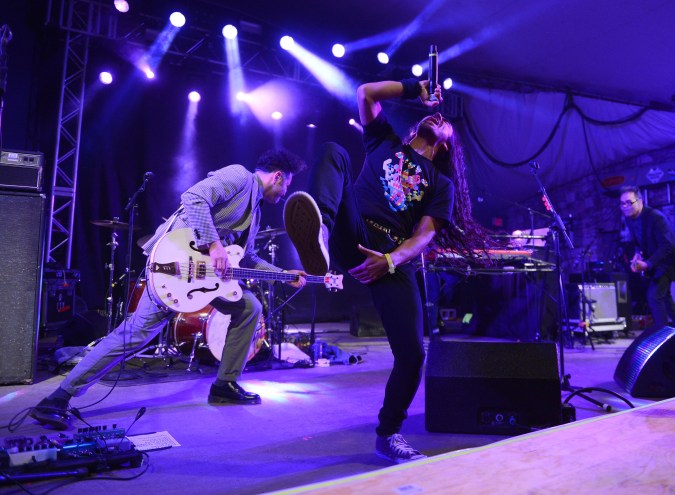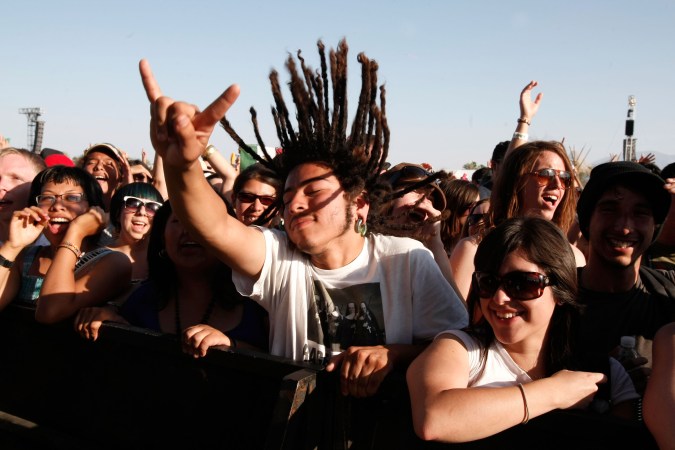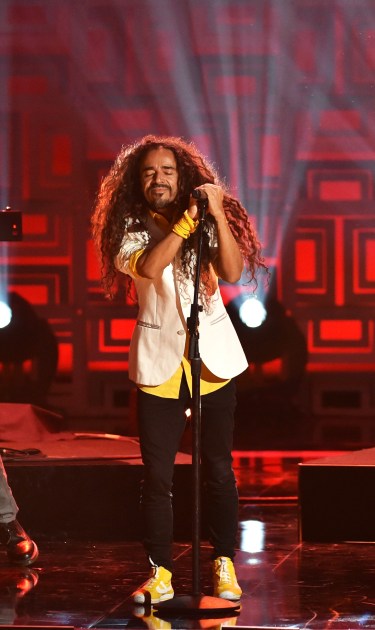Very few bands last for more than 20 years, less so without a lineup change, and even less are the ones who can see they are still active and have an international following. Café Tacvba manage to be all of that, going on after starting 25 years ago in the borough of Ciudad Stellite, between Estado de Mexico and the City. They are still relevant to millions of people, headlining festivals and arena tours, as well as records that still feel like being events. On the eve of their US tour to celebrate 20 years of their breakthrough work, Re, bassist Enrique “Quique” Rangel called us to talk about the album that spawned “La Ingrata,” “Las Flores,” “El Metro,” and “El Baile y El Salón;” musical fusion, and a world that existed 20 years ago as well as the one we’re living in today.
How is the tour going?
Today and tomorrow we are having dress rehearsals, with the lights and the whole production. For the past few weeks we have been remembering, and picking apart the songs from Re. Some of these songs have remained on our repertoire because people wouldn’t forgive us if we didn’t play them. Others, though, I think it’s been 20 years since the last time we played them. It has been a tough but fun labor. There’s good stamina within the band.
It’s an excuse to go play places where there’s a demand to see Café Tacvba play live.
How does it feel to embark on this celebration? 25 years of Café Tacvba, 20 of Re…
On the one hand, it’s weird because we consider that Café Tacvba is still ongoing. We still have the intention of writing and releasing songs and records. Our latest album, El Objeto Antes Llamado Disco, gave us a chance to indulge in that side. In a way, this celebration of Re, let’s say there was a public demand for it, because of the love some people have for some of the songs in that album. For many it was the first time they listened to us and definitely it’s the record that opened the door for us in USA, South America, Spain. It helps take a moment to look back on our history to help us keep going with what we want to do.
It’s a celebration, it’s an excuse to remember songs that we haven’t played in a while. Play those songs in a way that we would have wanted to play them, back in the day, front to back. It’s an excuse to go play places where there’s a demand to see Café Tacvba play live.
Now that you are in a nostalgic mood, what do you remember of recording Re and that whole era?
Some of these songs, we played them on the tour for our first album. There are a lot of songs that are influenced by the sounds we discovered while we were on tour in Mexico, like huapango on “Las Flores” or banda sinaloense on “El Fin De La Infancia.” There was an intention of broadening our experimental field to other genres, and that’s how you get stuff in the rock vein like “La Pinta” or “El Borrego” and then other songs like “Esa Noche” that has continuity with traditional Mexican music.

At the time, we didn’t know where we wanted to go but we knew where we were coming from. Like saying “yes, we are a rock band, but we have elements that makes us Mexicans, from the City and from a certain part of that city. That’s our approach to music, we can’t deny it. We couldn’t pretend to be a sophisticated band and talk in futuristic or cosmopolitan terms. We’re in a band with lyrics that are more like short stories and reflections that sometimes they don’t have an answers, they are more like questions.
Your eponymous debut did really well. How was it do make a follow up?
We were coming from some success from our first album, along with other bands that at the time were on the scene: Fobia, Maldita [Vecindad], Caifanes. We were one of the new bands that were falling in line with this wave and generated a big audience. That said, Re was not as successful or as recognized as it later came to be; I would go as far as saying that it got rejected by a lot of the audience and people who reviewed it, which was weird but we knew there was something important in what we were doing.
We knew there was something important in what we were doing.
That’s interesting, your first album laid a lot of groundwork for what you would later do. Besides, you have always being very eclectic, from the very beginning.
That was the first time that it weirded us out and that’s also when we said, “okay, do we want to repeat ourselves, find a style, and develop within it throughout our career, or are we going like when we started, still experimenting and going to unknown places?” On our following record [Avalancha De Éxitos], we realized there was a constant: there’s a group of critics who come along with you in the journey, and then there are others who, once they they identify with you, they don’t want a variation of what you did, they just want you to repeat the same song over and over again.
You can’t stay in the same place, artistically speaking.
Precisely. It’s part of the doubt…we’re four musicians and composers. Someone brings an idea, sometimes the other brings another one. If all four of us agreed, those two ideas next to each other could coexist onstage or on the records…that’s how it developed. That’s why there were 20 songs on Re; we had so many ideas and they were all so different from each other. We didn’t have leftover songs; we included all the songs we wrote and arranged because we knew they represented parts of a complete work.
Right now we’re living in times where genre boundaries are not as strict as they once were. You never lived for one genre. Back then, it wasn’t as common.
We have given ourselves the luxury of experimenting, for example, in a record like Revés/Yo Soy. Revés is completely instrumental and that’s how it came out; at first, we wanted to incorporate lyrics but, in the end, we realized that it’s a piece of work that didn’t need them, so we released it like that. It wasn’t very well understood by the label, it wasn’t well distributed, but at the same time there are people who think it’s one of our greatest albums. I don’t know, I’m really happy to be in a band where experimentation is part of its day to day cycle, where this eclecticism has its place. Us four, as individuals, don’t really share a lot of musical tastes…even I don’t know what some of the guys listen to, but that’s not important, because I know when we get together, their contributions will enrich the idea I might have, and vice versa. It’s never been like “let’s sound like this or that band.” It’s always “can this element become Café Tacvba music? Then let’s go ahead.”
It’s always “can this element become Café Tacvba music? Then let’s go ahead.”
At the time, did you feel these songs you were coming up with were that special?
There were some songs that we knew were going to be well received by the public but there were surprises. I remember when we released “La Ingrata”…well first of all, the record company said there were no singles in the album; which was important in learning how they view music in the record industry. When we released “La Ingrata,” people were a little taken aback by it because they said that it wasn’t exactly what we had done in the last album even though we had done norteño music already. With time, people adopted it and it became one of the trademark songs of Re.
Did the process for writing and recording Re establish certain ways in which you still work? Was it something you have never done again?
Our songwriting process almost always starts with individual ideas, we rarely get together to see what happens. Everyone brings something, sometimes it’s a complete idea and sometimes it’s just a fragment. I perfectly remember that at the beginning of 1994, we worked seven weeks from 9:00 am to 2:00 PM; at that point, we were still living very close by in Naucalpan. We had such discipline —I don’t pine for it because we are still pretty disciplined— because we wanted everything to turn out well. We found out then that we discovered that we are better at writing and arranging songs in the morning.

Like you said, Re made a big splash in other countries. Why do you think it happened with this album? It certainly doesn’t scream “global crossover.” In fact, there are a ton of musical and lyrical references to the local Mexican experience.
When Re was released, and all four of us agree, we didn’t think it had such a big or warm reception. People felt that in this experimentation, we were doing was not something they expected from us. It also had to do with the economic situation that was happening in the country at the time; we’re talking about the “December error” in 1994, and in 1995 we suffered an important recession. Then we found out through our label that “El Ciclón” was getting airplay in Chile, and “Ingrata” was all over radio in Colombia, while here in Mexico we didn’t exist as far as the media was concerned.
When we got asked to play in other places, we found out that a big part of our approval was because of these “Mexicanisms.”
When we got asked to play in other places, we found out that a big part of our approval was because of these “Mexicanisms,” there are local references and flavors that impregnated our music and they couldn’t have come out any other way. When we started Café Tacvba, one of the things we talked about was not to pretend we were making music anywhere else in the world but Mexico City, talking about our experiences from our immediate reality. And people found some common ground with their culture; in Argentina, Chile, Colombia, and Bolivia. We share the language but there’s also this duality that we as mestizos, cultures that are founded through mixture, we believe are impregnated in our music.
You have been around for 25 years without a lineup change. It’s impressive just to be around that long without breaking up, let alone being the same people since the beginning. Why do you think you managed to last this long?
When we started there was not a chance that this would become our job, there was no money to speak of, fame less so. There was a big desire to get onstage and express our ideas and emotions through our songs, gigs and recordings. When the possibility came up of making recordings and actually having it become something bigger, we started to see some money and it started to become our way of life. That’s something we have to remind ourselves every day, especially in moments when there’s friction and differences of opinions. Of course, there are times when being together can be tiring so we take as many breaks and sabbaticals as we need so each one can focus on their personal projects, be them musical or not. We have to always remember that what brought us together was music, and we still make music we’re proud of. It still finds people who like it, and it’s still part of their lives.




